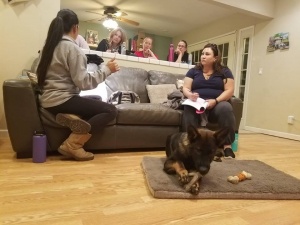
Let’s talk about different types of dog training and why one is always more successful than the others. Growing, puppy Jett is mastering his house manners. As an adolescent, working line German Shepherd who loves affection and play, he has a strong desire to greet and interact with guests. An overly social puppy is a great problem to have, if you know how to properly teach manners.
So how do we handle a parade of visitors coming through the front door (in this case our trainer’s club students)?
Nearly all dog trainers and many dog owners would attempt to use obedience commands like sit, down, leave it, park it (place) in an attempt to control their dog’s excitable behavior. Other dog owners would start to punish their dog for jumping up, barking, or being impolite with loud NO’s or noise makers designed to startle the dog into stopping. Still others would try to use high value treats to capture their dog’s attention and (hopefully) keep the focus on you.
But all of those are flawed training systems.
To find the real solution, you have to understand the problem. Why is your dog excited when people come over? For social dogs, a visitor at the door means petting, attention, affection, and sometimes even treats! That combination of amazing rewards is pretty irresistible to a lot of dogs and causes them to get into a high energy, low impulse control state of mind.
So if you are practicing a pattern of having guests immediately interact with your dog and then expecting your dog to be able to follow obedience commands, calmly take treats, or respond to your loud NO’s, you’re setting them up to fail. It’s like giving a kid 3 cupcakes and a soda and then asking them to sit still. It just doesn’t work that way!
So what does work?
Since you now know the source of your dog’s rude behavior is getting too excited about having company over, how about changing your dog’s expectations about what happens when guests arrive?? For puppy Jett, he has seen friendly faces come in the door time and time again who ignore him for the first 15 minutes of their stay.
This gives Jett time to settle and reduce his over excited behavior so that when it’s time to interact with friends, he makes appropriate choices all on his own. Rather than trying to battle against Jett’s excitability by asking him to preform sit stays or park its, we choose instead to reward a calm state of mind where Jett naturally offers the behavior we want.
This is the difference in Tug Dogs training philosophy.
Our trainers work hard to give you real training solutions that take into consideration your dog’s point of view and experiences to ensure training sets both of you up to be successful. With just a few days of practice, Jett is now silent when the door bell rings and simply sniffs and wags his tail at guests but then chooses to grab a toy and lay down on a dog bed instead of barking and jumping at them wildly.
Want your dog to be like Jett? Start considering what you are teaching him or her to expect when people come over and if you run into trouble, give us a call. Our skilled trainers can help you develop a plan to ensure your dog is a well behaved family member.
